ACC621 Report: Analyzing Technology in Audit Engagements S2 2019
VerifiedAdded on 2022/11/10
|9
|2118
|438
Report
AI Summary
This report examines the impact of technology on audit engagements, focusing on Audit Support Systems, Cognitive Technology (AI), and Data Analytics. It discusses how these technologies affect communication within audit teams, audit analytical procedures, and the decision-making process. The report argues that while these technologies offer significant advantages such as improved data processing, reduced human bias, and enhanced risk analysis, they cannot entirely replace auditor's professional skepticism and judgment. The implementation of an audit support system is recommended for its ability to customize auditing systems, improve communication, and eliminate human bias. The analysis includes references to relevant academic literature, highlighting the crucial role of technology in modern auditing practices. Desklib provides a platform for students to access similar solved assignments and past papers.
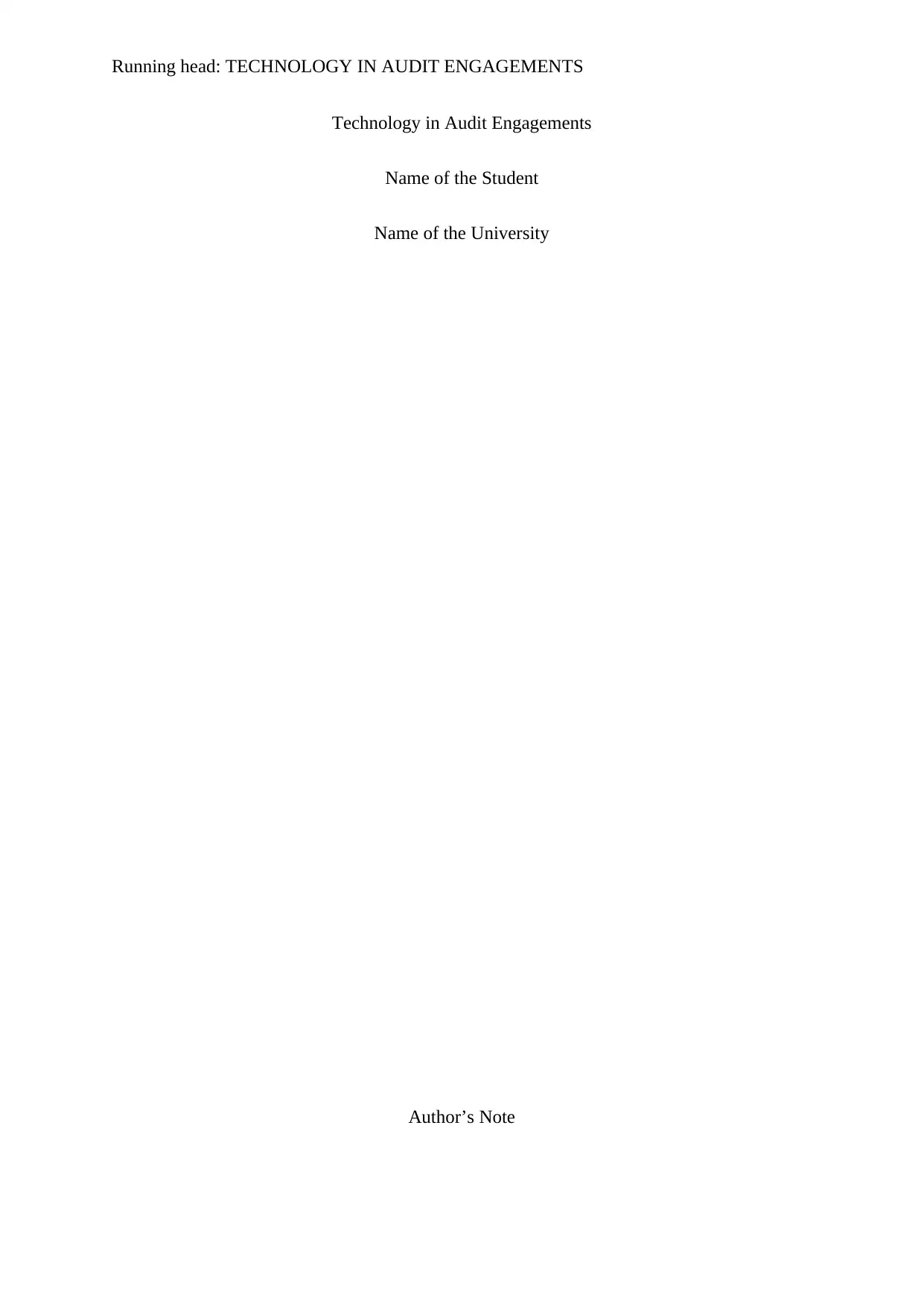
Running head: TECHNOLOGY IN AUDIT ENGAGEMENTS
Technology in Audit Engagements
Name of the Student
Name of the University
Author’s Note
Technology in Audit Engagements
Name of the Student
Name of the University
Author’s Note
Paraphrase This Document
Need a fresh take? Get an instant paraphrase of this document with our AI Paraphraser
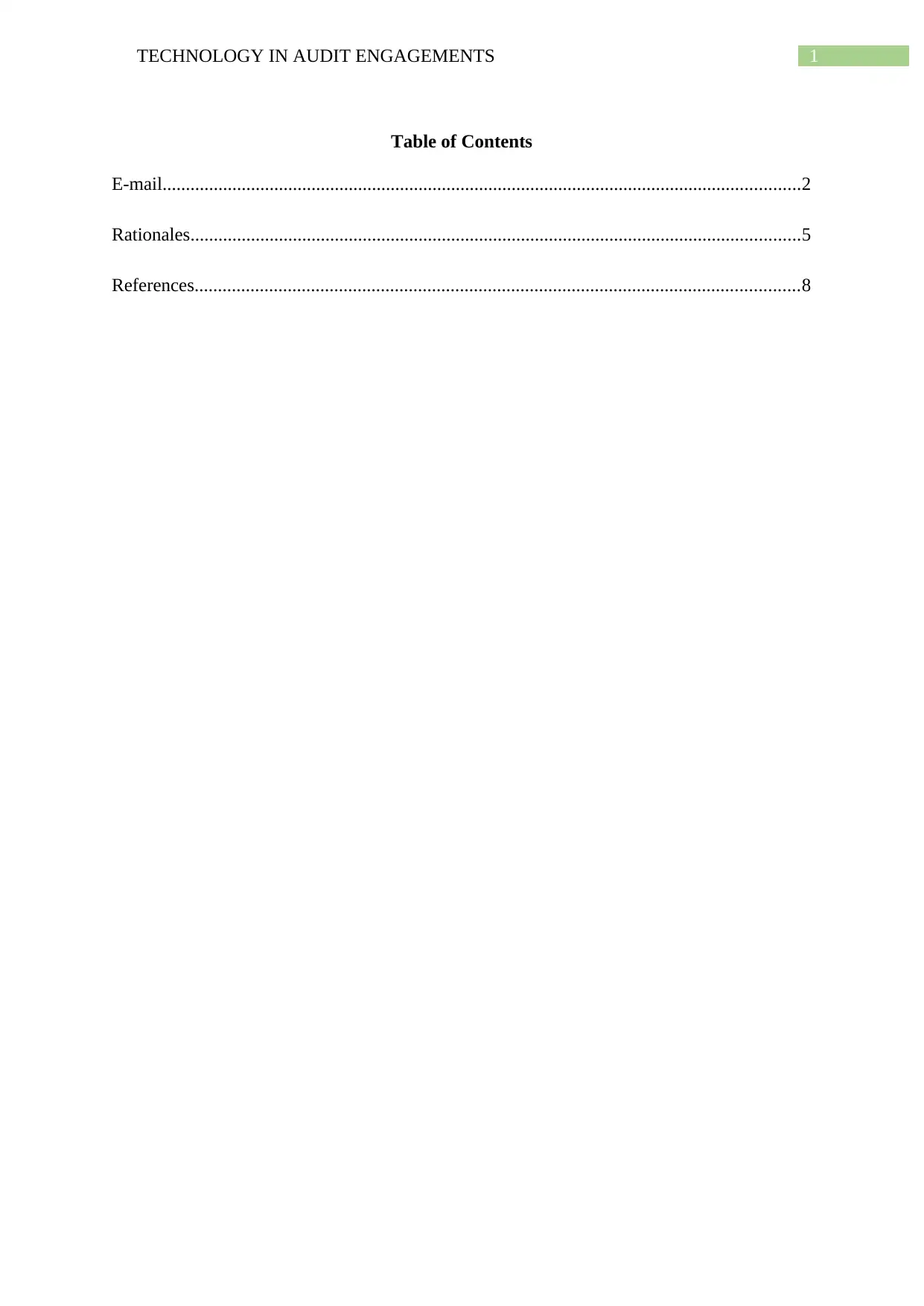
1TECHNOLOGY IN AUDIT ENGAGEMENTS
Table of Contents
E-mail.........................................................................................................................................2
Rationales...................................................................................................................................5
References..................................................................................................................................8
Table of Contents
E-mail.........................................................................................................................................2
Rationales...................................................................................................................................5
References..................................................................................................................................8
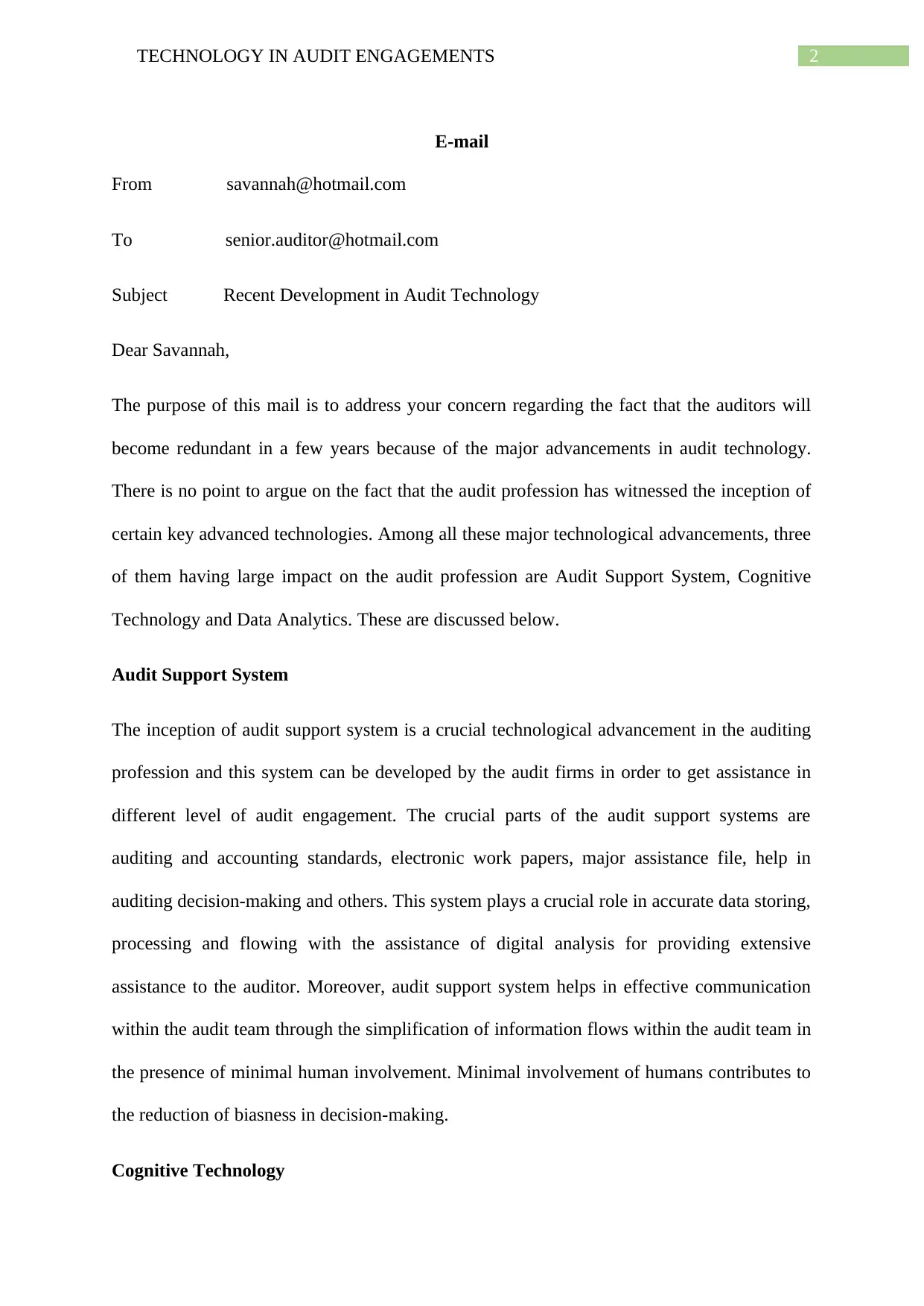
2TECHNOLOGY IN AUDIT ENGAGEMENTS
E-mail
From savannah@hotmail.com
To senior.auditor@hotmail.com
Subject Recent Development in Audit Technology
Dear Savannah,
The purpose of this mail is to address your concern regarding the fact that the auditors will
become redundant in a few years because of the major advancements in audit technology.
There is no point to argue on the fact that the audit profession has witnessed the inception of
certain key advanced technologies. Among all these major technological advancements, three
of them having large impact on the audit profession are Audit Support System, Cognitive
Technology and Data Analytics. These are discussed below.
Audit Support System
The inception of audit support system is a crucial technological advancement in the auditing
profession and this system can be developed by the audit firms in order to get assistance in
different level of audit engagement. The crucial parts of the audit support systems are
auditing and accounting standards, electronic work papers, major assistance file, help in
auditing decision-making and others. This system plays a crucial role in accurate data storing,
processing and flowing with the assistance of digital analysis for providing extensive
assistance to the auditor. Moreover, audit support system helps in effective communication
within the audit team through the simplification of information flows within the audit team in
the presence of minimal human involvement. Minimal involvement of humans contributes to
the reduction of biasness in decision-making.
Cognitive Technology
From savannah@hotmail.com
To senior.auditor@hotmail.com
Subject Recent Development in Audit Technology
Dear Savannah,
The purpose of this mail is to address your concern regarding the fact that the auditors will
become redundant in a few years because of the major advancements in audit technology.
There is no point to argue on the fact that the audit profession has witnessed the inception of
certain key advanced technologies. Among all these major technological advancements, three
of them having large impact on the audit profession are Audit Support System, Cognitive
Technology and Data Analytics. These are discussed below.
Audit Support System
The inception of audit support system is a crucial technological advancement in the auditing
profession and this system can be developed by the audit firms in order to get assistance in
different level of audit engagement. The crucial parts of the audit support systems are
auditing and accounting standards, electronic work papers, major assistance file, help in
auditing decision-making and others. This system plays a crucial role in accurate data storing,
processing and flowing with the assistance of digital analysis for providing extensive
assistance to the auditor. Moreover, audit support system helps in effective communication
within the audit team through the simplification of information flows within the audit team in
the presence of minimal human involvement. Minimal involvement of humans contributes to
the reduction of biasness in decision-making.
Cognitive Technology
⊘ This is a preview!⊘
Do you want full access?
Subscribe today to unlock all pages.

Trusted by 1+ million students worldwide
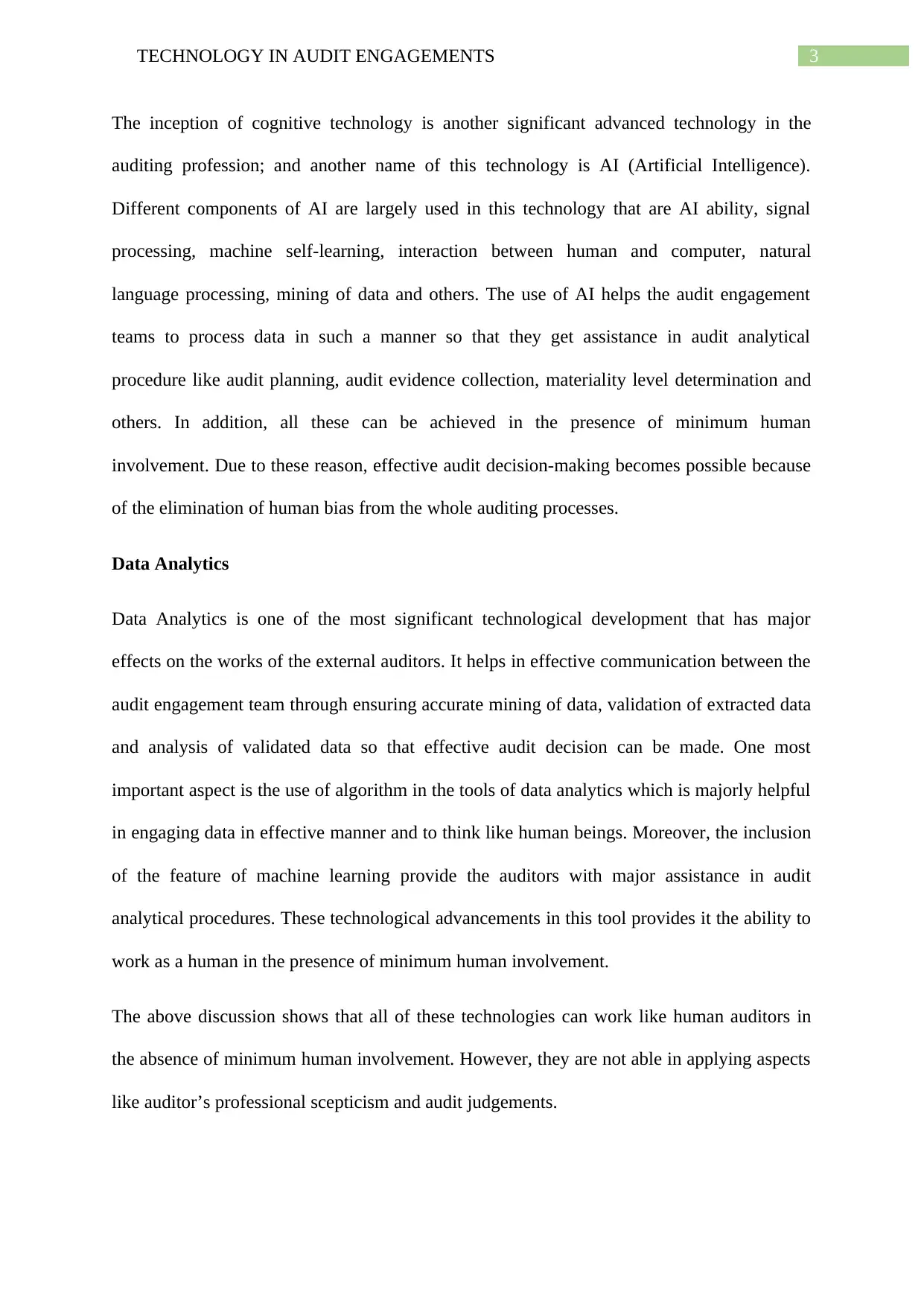
3TECHNOLOGY IN AUDIT ENGAGEMENTS
The inception of cognitive technology is another significant advanced technology in the
auditing profession; and another name of this technology is AI (Artificial Intelligence).
Different components of AI are largely used in this technology that are AI ability, signal
processing, machine self-learning, interaction between human and computer, natural
language processing, mining of data and others. The use of AI helps the audit engagement
teams to process data in such a manner so that they get assistance in audit analytical
procedure like audit planning, audit evidence collection, materiality level determination and
others. In addition, all these can be achieved in the presence of minimum human
involvement. Due to these reason, effective audit decision-making becomes possible because
of the elimination of human bias from the whole auditing processes.
Data Analytics
Data Analytics is one of the most significant technological development that has major
effects on the works of the external auditors. It helps in effective communication between the
audit engagement team through ensuring accurate mining of data, validation of extracted data
and analysis of validated data so that effective audit decision can be made. One most
important aspect is the use of algorithm in the tools of data analytics which is majorly helpful
in engaging data in effective manner and to think like human beings. Moreover, the inclusion
of the feature of machine learning provide the auditors with major assistance in audit
analytical procedures. These technological advancements in this tool provides it the ability to
work as a human in the presence of minimum human involvement.
The above discussion shows that all of these technologies can work like human auditors in
the absence of minimum human involvement. However, they are not able in applying aspects
like auditor’s professional scepticism and audit judgements.
The inception of cognitive technology is another significant advanced technology in the
auditing profession; and another name of this technology is AI (Artificial Intelligence).
Different components of AI are largely used in this technology that are AI ability, signal
processing, machine self-learning, interaction between human and computer, natural
language processing, mining of data and others. The use of AI helps the audit engagement
teams to process data in such a manner so that they get assistance in audit analytical
procedure like audit planning, audit evidence collection, materiality level determination and
others. In addition, all these can be achieved in the presence of minimum human
involvement. Due to these reason, effective audit decision-making becomes possible because
of the elimination of human bias from the whole auditing processes.
Data Analytics
Data Analytics is one of the most significant technological development that has major
effects on the works of the external auditors. It helps in effective communication between the
audit engagement team through ensuring accurate mining of data, validation of extracted data
and analysis of validated data so that effective audit decision can be made. One most
important aspect is the use of algorithm in the tools of data analytics which is majorly helpful
in engaging data in effective manner and to think like human beings. Moreover, the inclusion
of the feature of machine learning provide the auditors with major assistance in audit
analytical procedures. These technological advancements in this tool provides it the ability to
work as a human in the presence of minimum human involvement.
The above discussion shows that all of these technologies can work like human auditors in
the absence of minimum human involvement. However, they are not able in applying aspects
like auditor’s professional scepticism and audit judgements.
Paraphrase This Document
Need a fresh take? Get an instant paraphrase of this document with our AI Paraphraser
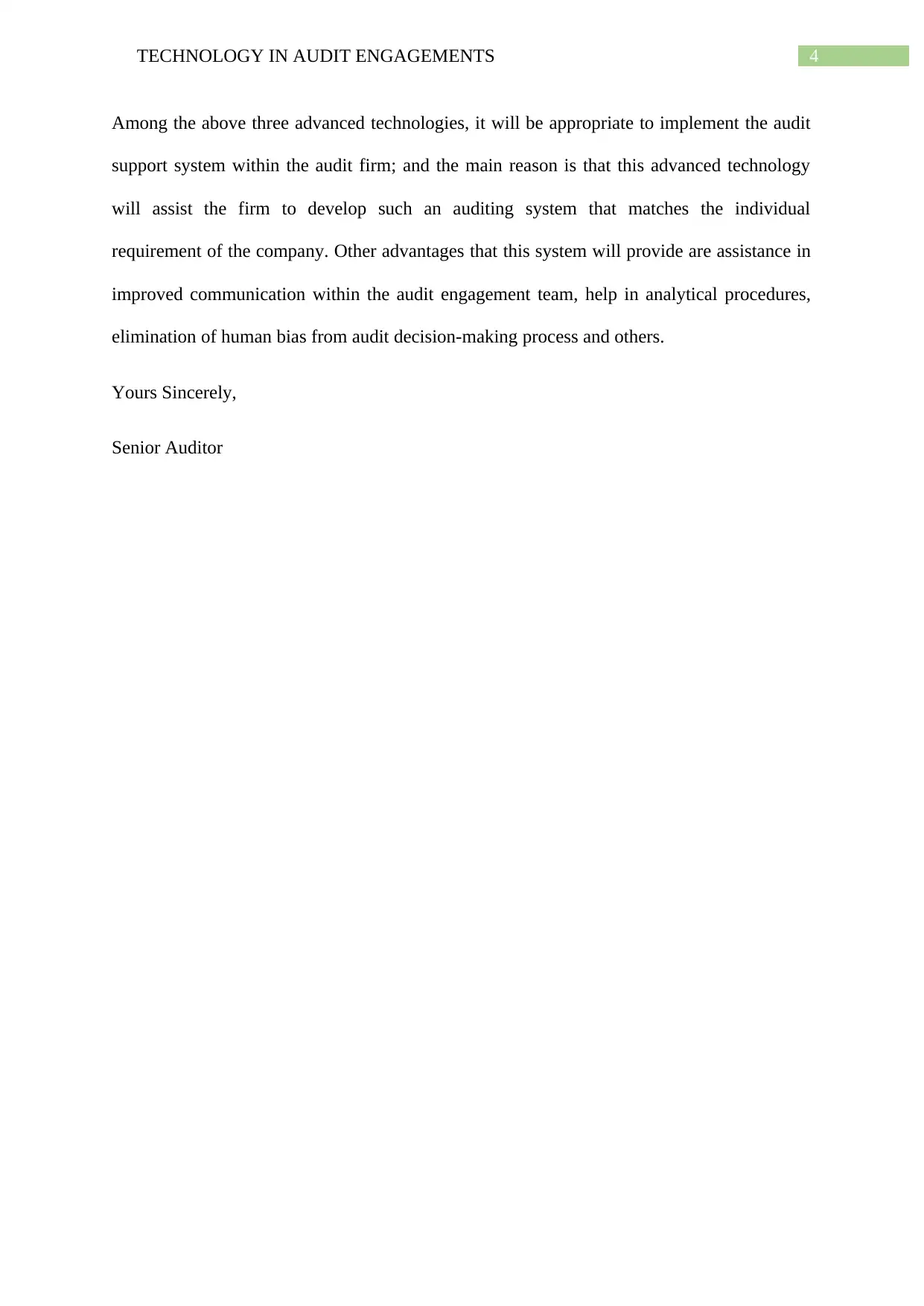
4TECHNOLOGY IN AUDIT ENGAGEMENTS
Among the above three advanced technologies, it will be appropriate to implement the audit
support system within the audit firm; and the main reason is that this advanced technology
will assist the firm to develop such an auditing system that matches the individual
requirement of the company. Other advantages that this system will provide are assistance in
improved communication within the audit engagement team, help in analytical procedures,
elimination of human bias from audit decision-making process and others.
Yours Sincerely,
Senior Auditor
Among the above three advanced technologies, it will be appropriate to implement the audit
support system within the audit firm; and the main reason is that this advanced technology
will assist the firm to develop such an auditing system that matches the individual
requirement of the company. Other advantages that this system will provide are assistance in
improved communication within the audit engagement team, help in analytical procedures,
elimination of human bias from audit decision-making process and others.
Yours Sincerely,
Senior Auditor
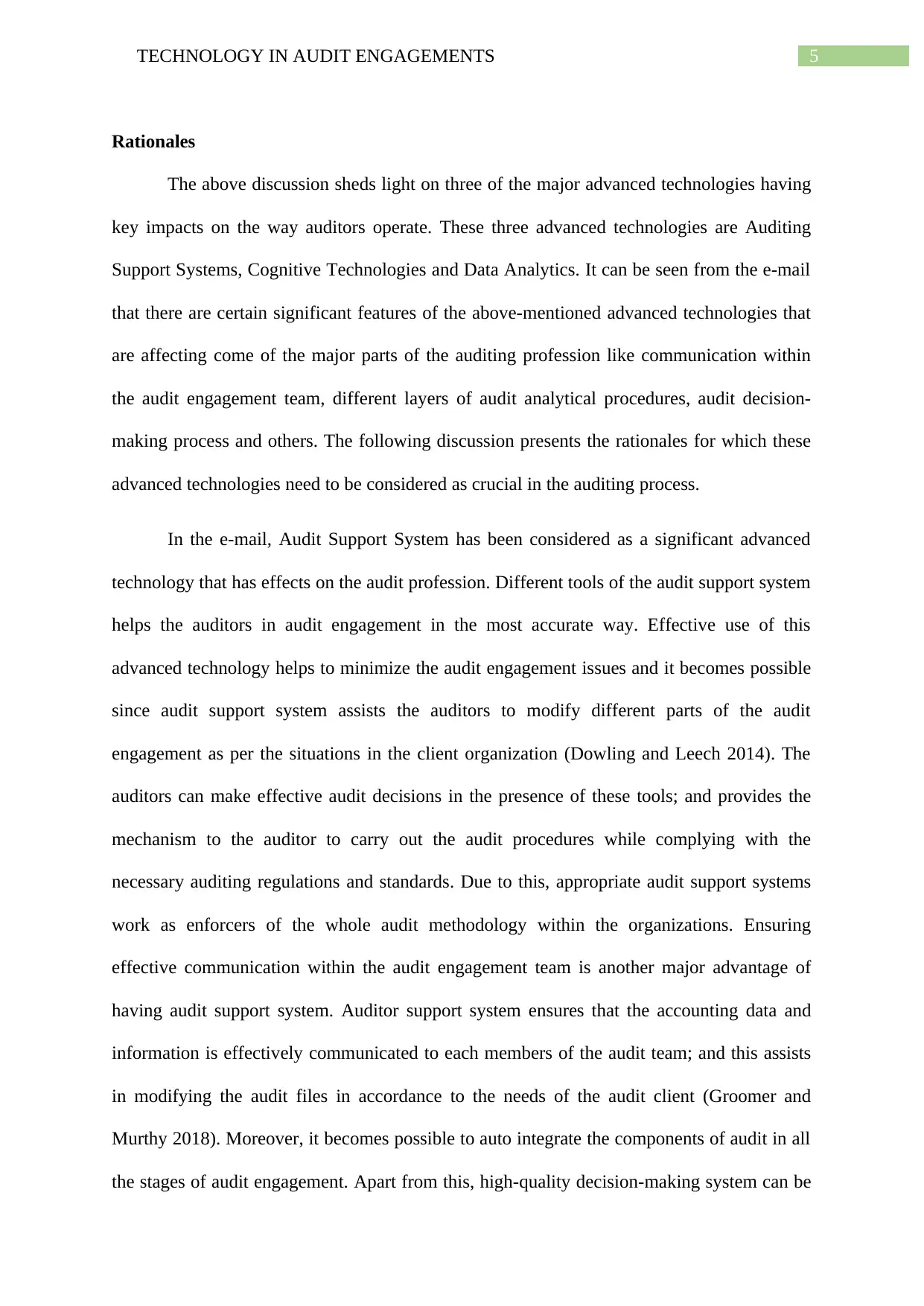
5TECHNOLOGY IN AUDIT ENGAGEMENTS
Rationales
The above discussion sheds light on three of the major advanced technologies having
key impacts on the way auditors operate. These three advanced technologies are Auditing
Support Systems, Cognitive Technologies and Data Analytics. It can be seen from the e-mail
that there are certain significant features of the above-mentioned advanced technologies that
are affecting come of the major parts of the auditing profession like communication within
the audit engagement team, different layers of audit analytical procedures, audit decision-
making process and others. The following discussion presents the rationales for which these
advanced technologies need to be considered as crucial in the auditing process.
In the e-mail, Audit Support System has been considered as a significant advanced
technology that has effects on the audit profession. Different tools of the audit support system
helps the auditors in audit engagement in the most accurate way. Effective use of this
advanced technology helps to minimize the audit engagement issues and it becomes possible
since audit support system assists the auditors to modify different parts of the audit
engagement as per the situations in the client organization (Dowling and Leech 2014). The
auditors can make effective audit decisions in the presence of these tools; and provides the
mechanism to the auditor to carry out the audit procedures while complying with the
necessary auditing regulations and standards. Due to this, appropriate audit support systems
work as enforcers of the whole audit methodology within the organizations. Ensuring
effective communication within the audit engagement team is another major advantage of
having audit support system. Auditor support system ensures that the accounting data and
information is effectively communicated to each members of the audit team; and this assists
in modifying the audit files in accordance to the needs of the audit client (Groomer and
Murthy 2018). Moreover, it becomes possible to auto integrate the components of audit in all
the stages of audit engagement. Apart from this, high-quality decision-making system can be
Rationales
The above discussion sheds light on three of the major advanced technologies having
key impacts on the way auditors operate. These three advanced technologies are Auditing
Support Systems, Cognitive Technologies and Data Analytics. It can be seen from the e-mail
that there are certain significant features of the above-mentioned advanced technologies that
are affecting come of the major parts of the auditing profession like communication within
the audit engagement team, different layers of audit analytical procedures, audit decision-
making process and others. The following discussion presents the rationales for which these
advanced technologies need to be considered as crucial in the auditing process.
In the e-mail, Audit Support System has been considered as a significant advanced
technology that has effects on the audit profession. Different tools of the audit support system
helps the auditors in audit engagement in the most accurate way. Effective use of this
advanced technology helps to minimize the audit engagement issues and it becomes possible
since audit support system assists the auditors to modify different parts of the audit
engagement as per the situations in the client organization (Dowling and Leech 2014). The
auditors can make effective audit decisions in the presence of these tools; and provides the
mechanism to the auditor to carry out the audit procedures while complying with the
necessary auditing regulations and standards. Due to this, appropriate audit support systems
work as enforcers of the whole audit methodology within the organizations. Ensuring
effective communication within the audit engagement team is another major advantage of
having audit support system. Auditor support system ensures that the accounting data and
information is effectively communicated to each members of the audit team; and this assists
in modifying the audit files in accordance to the needs of the audit client (Groomer and
Murthy 2018). Moreover, it becomes possible to auto integrate the components of audit in all
the stages of audit engagement. Apart from this, high-quality decision-making system can be
⊘ This is a preview!⊘
Do you want full access?
Subscribe today to unlock all pages.

Trusted by 1+ million students worldwide
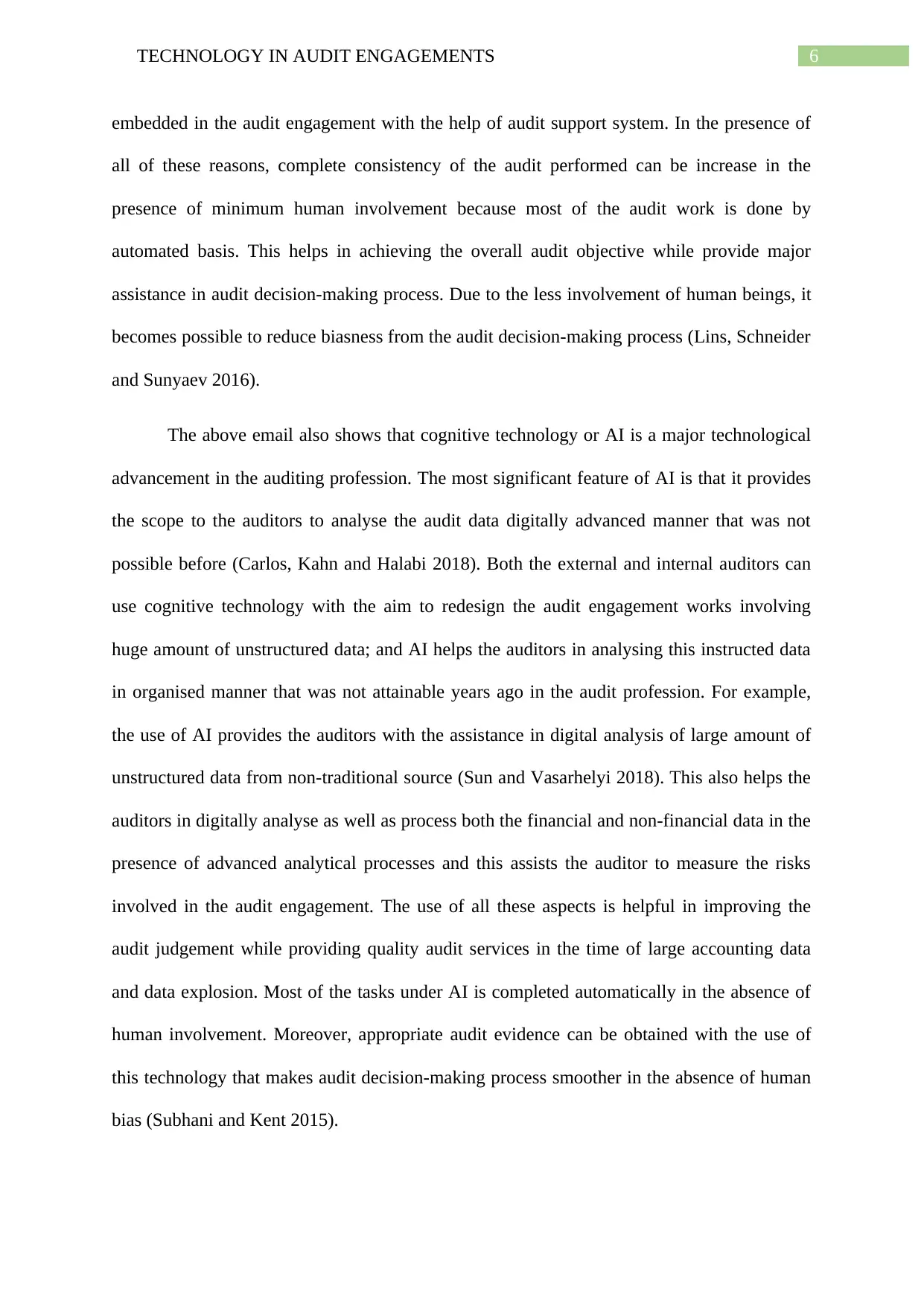
6TECHNOLOGY IN AUDIT ENGAGEMENTS
embedded in the audit engagement with the help of audit support system. In the presence of
all of these reasons, complete consistency of the audit performed can be increase in the
presence of minimum human involvement because most of the audit work is done by
automated basis. This helps in achieving the overall audit objective while provide major
assistance in audit decision-making process. Due to the less involvement of human beings, it
becomes possible to reduce biasness from the audit decision-making process (Lins, Schneider
and Sunyaev 2016).
The above email also shows that cognitive technology or AI is a major technological
advancement in the auditing profession. The most significant feature of AI is that it provides
the scope to the auditors to analyse the audit data digitally advanced manner that was not
possible before (Carlos, Kahn and Halabi 2018). Both the external and internal auditors can
use cognitive technology with the aim to redesign the audit engagement works involving
huge amount of unstructured data; and AI helps the auditors in analysing this instructed data
in organised manner that was not attainable years ago in the audit profession. For example,
the use of AI provides the auditors with the assistance in digital analysis of large amount of
unstructured data from non-traditional source (Sun and Vasarhelyi 2018). This also helps the
auditors in digitally analyse as well as process both the financial and non-financial data in the
presence of advanced analytical processes and this assists the auditor to measure the risks
involved in the audit engagement. The use of all these aspects is helpful in improving the
audit judgement while providing quality audit services in the time of large accounting data
and data explosion. Most of the tasks under AI is completed automatically in the absence of
human involvement. Moreover, appropriate audit evidence can be obtained with the use of
this technology that makes audit decision-making process smoother in the absence of human
bias (Subhani and Kent 2015).
embedded in the audit engagement with the help of audit support system. In the presence of
all of these reasons, complete consistency of the audit performed can be increase in the
presence of minimum human involvement because most of the audit work is done by
automated basis. This helps in achieving the overall audit objective while provide major
assistance in audit decision-making process. Due to the less involvement of human beings, it
becomes possible to reduce biasness from the audit decision-making process (Lins, Schneider
and Sunyaev 2016).
The above email also shows that cognitive technology or AI is a major technological
advancement in the auditing profession. The most significant feature of AI is that it provides
the scope to the auditors to analyse the audit data digitally advanced manner that was not
possible before (Carlos, Kahn and Halabi 2018). Both the external and internal auditors can
use cognitive technology with the aim to redesign the audit engagement works involving
huge amount of unstructured data; and AI helps the auditors in analysing this instructed data
in organised manner that was not attainable years ago in the audit profession. For example,
the use of AI provides the auditors with the assistance in digital analysis of large amount of
unstructured data from non-traditional source (Sun and Vasarhelyi 2018). This also helps the
auditors in digitally analyse as well as process both the financial and non-financial data in the
presence of advanced analytical processes and this assists the auditor to measure the risks
involved in the audit engagement. The use of all these aspects is helpful in improving the
audit judgement while providing quality audit services in the time of large accounting data
and data explosion. Most of the tasks under AI is completed automatically in the absence of
human involvement. Moreover, appropriate audit evidence can be obtained with the use of
this technology that makes audit decision-making process smoother in the absence of human
bias (Subhani and Kent 2015).
Paraphrase This Document
Need a fresh take? Get an instant paraphrase of this document with our AI Paraphraser
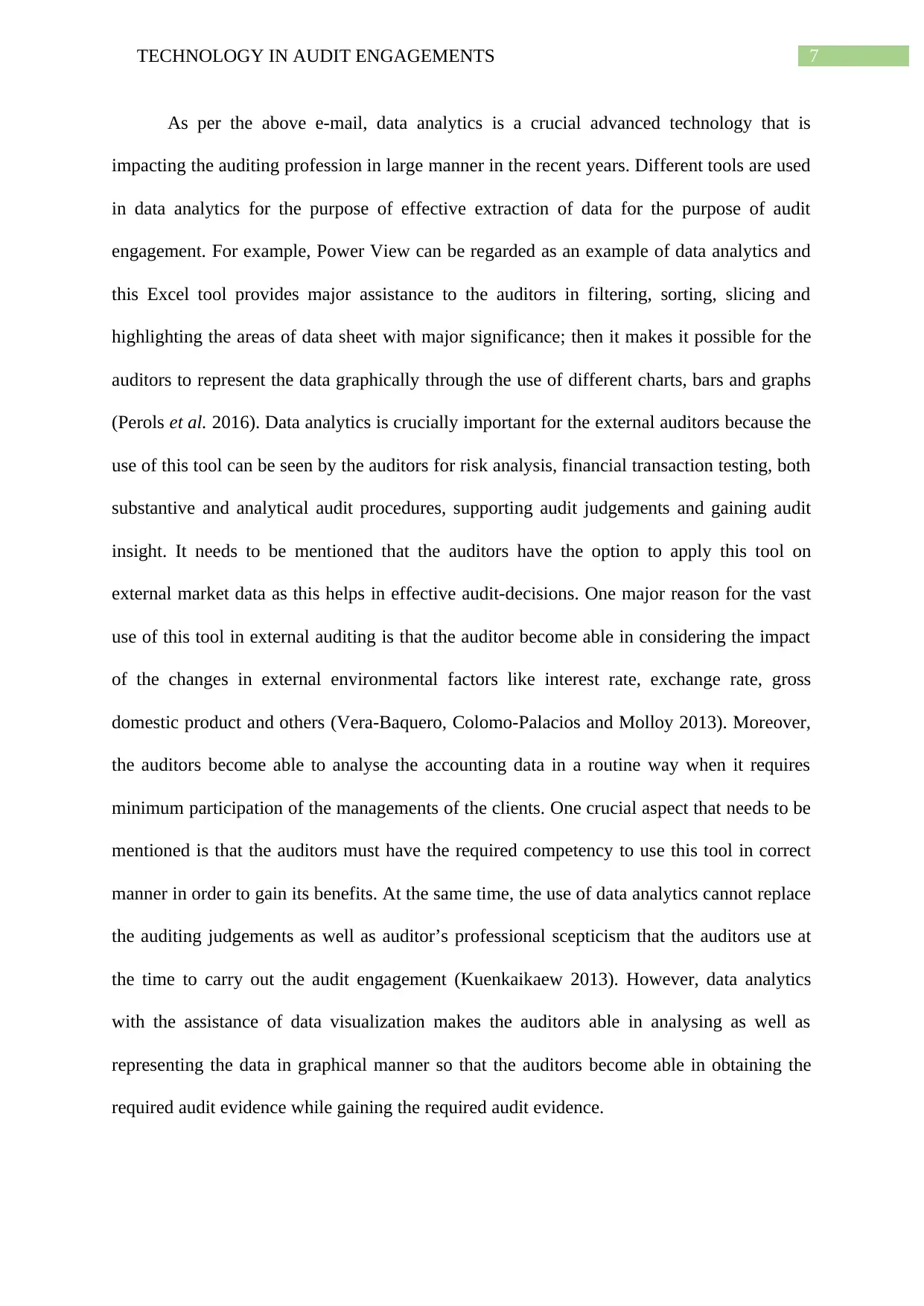
7TECHNOLOGY IN AUDIT ENGAGEMENTS
As per the above e-mail, data analytics is a crucial advanced technology that is
impacting the auditing profession in large manner in the recent years. Different tools are used
in data analytics for the purpose of effective extraction of data for the purpose of audit
engagement. For example, Power View can be regarded as an example of data analytics and
this Excel tool provides major assistance to the auditors in filtering, sorting, slicing and
highlighting the areas of data sheet with major significance; then it makes it possible for the
auditors to represent the data graphically through the use of different charts, bars and graphs
(Perols et al. 2016). Data analytics is crucially important for the external auditors because the
use of this tool can be seen by the auditors for risk analysis, financial transaction testing, both
substantive and analytical audit procedures, supporting audit judgements and gaining audit
insight. It needs to be mentioned that the auditors have the option to apply this tool on
external market data as this helps in effective audit-decisions. One major reason for the vast
use of this tool in external auditing is that the auditor become able in considering the impact
of the changes in external environmental factors like interest rate, exchange rate, gross
domestic product and others (Vera-Baquero, Colomo-Palacios and Molloy 2013). Moreover,
the auditors become able to analyse the accounting data in a routine way when it requires
minimum participation of the managements of the clients. One crucial aspect that needs to be
mentioned is that the auditors must have the required competency to use this tool in correct
manner in order to gain its benefits. At the same time, the use of data analytics cannot replace
the auditing judgements as well as auditor’s professional scepticism that the auditors use at
the time to carry out the audit engagement (Kuenkaikaew 2013). However, data analytics
with the assistance of data visualization makes the auditors able in analysing as well as
representing the data in graphical manner so that the auditors become able in obtaining the
required audit evidence while gaining the required audit evidence.
As per the above e-mail, data analytics is a crucial advanced technology that is
impacting the auditing profession in large manner in the recent years. Different tools are used
in data analytics for the purpose of effective extraction of data for the purpose of audit
engagement. For example, Power View can be regarded as an example of data analytics and
this Excel tool provides major assistance to the auditors in filtering, sorting, slicing and
highlighting the areas of data sheet with major significance; then it makes it possible for the
auditors to represent the data graphically through the use of different charts, bars and graphs
(Perols et al. 2016). Data analytics is crucially important for the external auditors because the
use of this tool can be seen by the auditors for risk analysis, financial transaction testing, both
substantive and analytical audit procedures, supporting audit judgements and gaining audit
insight. It needs to be mentioned that the auditors have the option to apply this tool on
external market data as this helps in effective audit-decisions. One major reason for the vast
use of this tool in external auditing is that the auditor become able in considering the impact
of the changes in external environmental factors like interest rate, exchange rate, gross
domestic product and others (Vera-Baquero, Colomo-Palacios and Molloy 2013). Moreover,
the auditors become able to analyse the accounting data in a routine way when it requires
minimum participation of the managements of the clients. One crucial aspect that needs to be
mentioned is that the auditors must have the required competency to use this tool in correct
manner in order to gain its benefits. At the same time, the use of data analytics cannot replace
the auditing judgements as well as auditor’s professional scepticism that the auditors use at
the time to carry out the audit engagement (Kuenkaikaew 2013). However, data analytics
with the assistance of data visualization makes the auditors able in analysing as well as
representing the data in graphical manner so that the auditors become able in obtaining the
required audit evidence while gaining the required audit evidence.
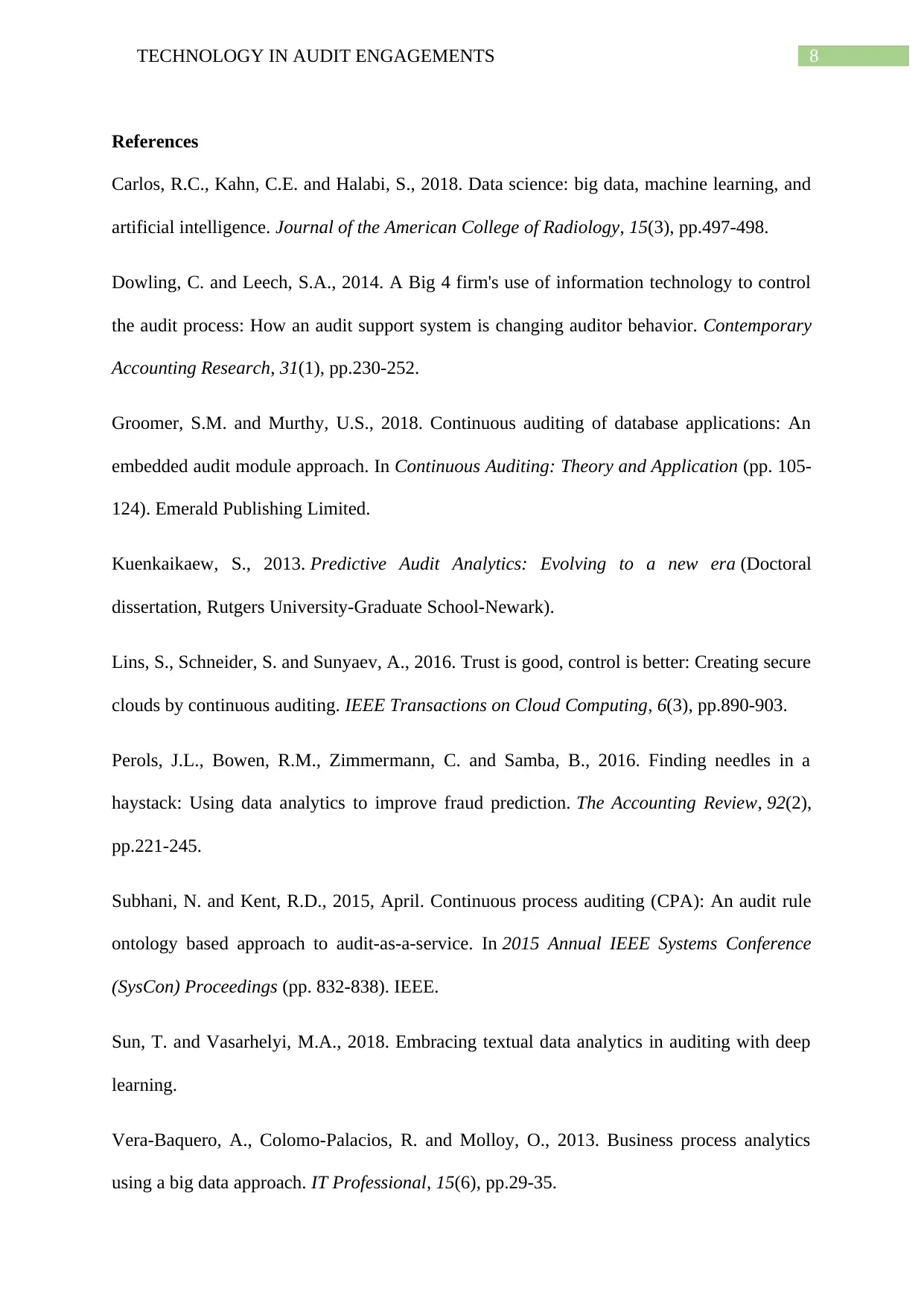
8TECHNOLOGY IN AUDIT ENGAGEMENTS
References
Carlos, R.C., Kahn, C.E. and Halabi, S., 2018. Data science: big data, machine learning, and
artificial intelligence. Journal of the American College of Radiology, 15(3), pp.497-498.
Dowling, C. and Leech, S.A., 2014. A Big 4 firm's use of information technology to control
the audit process: How an audit support system is changing auditor behavior. Contemporary
Accounting Research, 31(1), pp.230-252.
Groomer, S.M. and Murthy, U.S., 2018. Continuous auditing of database applications: An
embedded audit module approach. In Continuous Auditing: Theory and Application (pp. 105-
124). Emerald Publishing Limited.
Kuenkaikaew, S., 2013. Predictive Audit Analytics: Evolving to a new era (Doctoral
dissertation, Rutgers University-Graduate School-Newark).
Lins, S., Schneider, S. and Sunyaev, A., 2016. Trust is good, control is better: Creating secure
clouds by continuous auditing. IEEE Transactions on Cloud Computing, 6(3), pp.890-903.
Perols, J.L., Bowen, R.M., Zimmermann, C. and Samba, B., 2016. Finding needles in a
haystack: Using data analytics to improve fraud prediction. The Accounting Review, 92(2),
pp.221-245.
Subhani, N. and Kent, R.D., 2015, April. Continuous process auditing (CPA): An audit rule
ontology based approach to audit-as-a-service. In 2015 Annual IEEE Systems Conference
(SysCon) Proceedings (pp. 832-838). IEEE.
Sun, T. and Vasarhelyi, M.A., 2018. Embracing textual data analytics in auditing with deep
learning.
Vera-Baquero, A., Colomo-Palacios, R. and Molloy, O., 2013. Business process analytics
using a big data approach. IT Professional, 15(6), pp.29-35.
References
Carlos, R.C., Kahn, C.E. and Halabi, S., 2018. Data science: big data, machine learning, and
artificial intelligence. Journal of the American College of Radiology, 15(3), pp.497-498.
Dowling, C. and Leech, S.A., 2014. A Big 4 firm's use of information technology to control
the audit process: How an audit support system is changing auditor behavior. Contemporary
Accounting Research, 31(1), pp.230-252.
Groomer, S.M. and Murthy, U.S., 2018. Continuous auditing of database applications: An
embedded audit module approach. In Continuous Auditing: Theory and Application (pp. 105-
124). Emerald Publishing Limited.
Kuenkaikaew, S., 2013. Predictive Audit Analytics: Evolving to a new era (Doctoral
dissertation, Rutgers University-Graduate School-Newark).
Lins, S., Schneider, S. and Sunyaev, A., 2016. Trust is good, control is better: Creating secure
clouds by continuous auditing. IEEE Transactions on Cloud Computing, 6(3), pp.890-903.
Perols, J.L., Bowen, R.M., Zimmermann, C. and Samba, B., 2016. Finding needles in a
haystack: Using data analytics to improve fraud prediction. The Accounting Review, 92(2),
pp.221-245.
Subhani, N. and Kent, R.D., 2015, April. Continuous process auditing (CPA): An audit rule
ontology based approach to audit-as-a-service. In 2015 Annual IEEE Systems Conference
(SysCon) Proceedings (pp. 832-838). IEEE.
Sun, T. and Vasarhelyi, M.A., 2018. Embracing textual data analytics in auditing with deep
learning.
Vera-Baquero, A., Colomo-Palacios, R. and Molloy, O., 2013. Business process analytics
using a big data approach. IT Professional, 15(6), pp.29-35.
⊘ This is a preview!⊘
Do you want full access?
Subscribe today to unlock all pages.

Trusted by 1+ million students worldwide
1 out of 9
Related Documents
Your All-in-One AI-Powered Toolkit for Academic Success.
+13062052269
info@desklib.com
Available 24*7 on WhatsApp / Email
![[object Object]](/_next/static/media/star-bottom.7253800d.svg)
Unlock your academic potential
Copyright © 2020–2026 A2Z Services. All Rights Reserved. Developed and managed by ZUCOL.





